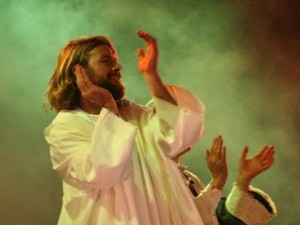From the Psalms:
When the Lord restored the fortunes of Zion, then were we like those who dream.
Then was our mouth filled with laughter, and our tongue with shouts of joy.
Then they said among the nations, “The Lord has done great things for them.”
The Lord has done great things for us, and we are glad indeed.
(From the Daily Office Lectionary – Psalm 126:1-4 (BCP Version) – October 9, 2012)
 Have you ever visited a church which as part of its normative worship service gives congregants an opportunity to voice aloud their own prayers to God? It may surprise some that the Episcopal Church is one such religious group. In the typical service of the Holy Eucharist in the Episcopal Church, following readings from Scripture, the sermon and a recitation of the Nicene Creed, the congregation is led in a responsive cycle of prayer called The Prayers of the People.
Have you ever visited a church which as part of its normative worship service gives congregants an opportunity to voice aloud their own prayers to God? It may surprise some that the Episcopal Church is one such religious group. In the typical service of the Holy Eucharist in the Episcopal Church, following readings from Scripture, the sermon and a recitation of the Nicene Creed, the congregation is led in a responsive cycle of prayer called The Prayers of the People.
A rubric (a direction for the conduct of worship services) in The Book of Common Prayer outlines what is to be included in these prayers. It states that
Prayer is offered with intercession for
The Universal Church, its members, and its mission
The Nation and all in authority
The welfare of the world
The concerns of the local community
Those who suffer and those in any trouble
The departed (with commemoration of a saint when appropriate)
(BCP, Page 359 or 383)
Six forms of suggested prayers are provided in the BCP, but other forms conforming to the rubrical requirements may be used. Each of those forms provides opportunities for silence during which the People are encouraged to speak their own petitions, intercessions, or thanksgivings. The sixth form even includes this specific invitation, “The People may add their own thanksgivings.” (Page 393)
I have visited a lot of Episcopal Churches. I have heard many prayer leaders invite the People’s prayers during those silences. I have seldom heard anyone laugh, shout with joy, or express gladness because the Lord has done great things for them. Why do you suppose that is? Garrison Keillor (who is an Episcopalian, by the way) has suggested that “Episcopalians believe in prayer, but would practically die if asked to pray out loud.” That may be doubly true of giving thanks out loud.
I have no answer to the question. Keillor suggests that Episcopalians are known for our blandness, our excessive calm, and our fear of giving offense, and maybe that’s part of it. I don’t know. But I do wish in prayers and worship that we would laugh a little more, shout with joy from time to time, and let our gladness show when God has done great things for us, because God has done great things for us!
====================
A request to my readers: I’m trying to build the readership of this blog and I’d very much appreciate your help in doing so. If you find something here that is of value, please share it with others. If you are on Facebook, “like” the posts on your page so others can see them. If you are following me on Twitter, please “retweet” the notices of these meditations. If you have a blog of your own, please include mine in your links (a favor I will gladly reciprocate). Many thanks!
====================
Father Funston is the rector of St. Paul’s Episcopal Church, Medina, Ohio.



Happy to share! I enjoy your daily reflections – they add to my own discipline and meditation in wonderful ways.